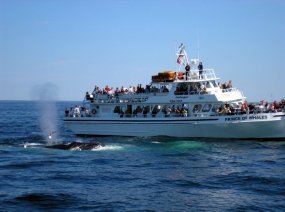Day Four: the future direction of the IWC, special permit whaling
and whale watching on the agenda
Day Four began by resuming discussions on the Florianopolis Declaration, a Government of Brazil Resolution proposing a vision for the IWC in the future. Resolutions are non-binding, formal statements of the IWC, adopted either by consensus or by simple majority. This proposal was not agreed by consensus and adopted by vote with 40 supporting votes, 27 against and 4 abstentions.
This was followed by a discussion on the second vision of the IWC’s future, a package of proposals from the Government of Japan called the Way Forward, comprising a Resolution and a Schedule Amendment. Unlike Resolutions, the Schedule forms a binding legal framework for the IWC, and amendments to it are adopted either by consensus or by three quarters majority vote.
The Commission’s exchanges on this agenda item were robust and it was not possible to reach agreement. The item was deferred until tomorrow to allow maximum time for consultation and dialogue.
The work of the Whale Killing Methods and Welfare Working Group was also reported to the Commission today. The report was endorsed, including the next steps in the Strandings Initiative, a programme to share expertise and best practice on response to cetacean strandings which was proposed and endorsed at the last Commission meeting in 2016.
Special Permit (or scientific) whaling was also discussed, with member governments expressing different views on whether lethal research is required, and whether the current Japanese research programmes are able to meet their stated objectives.
The new Whale Watching Handbook was welcomed and endorsed by the Commission as a comprehensive and practical resource. The Handbook aims to be a living and evolving tool which equips industry, regulators and policy makers, and the general public with the information they need to support the sustainable development of whale watching in places all over the world.
The report of the Finance and Administration Committee outlined an approach to manage the difficult financial position which has arisen in large part due to an increasing workplan over recent years and challenging wider financial climate. The Commission accepted with regret, the necessity of a cut to the budget of the Scientific Committee but not a rise in member contributions. The Government of Italy offered contributions of E15,000 to support the Scientific Committee budget and E5,000 to the Voluntary Fund for Small Cetaceans.
Other issues discussed today included Conservation Management Plans, International Research Programmes, Infractions, and the Revised Management Plan - the scientific process developed to estimate sustainable catch limits for commercial whaling, for use in the event that the Commission decides to set commercial catch limits in the future.
Two Resolutions were withdrawn today. The first was a Resolution on the 2030 Agenda, proposed by the Government of Brazil and seeking further synergies with other organisations. The second was a Resolution on Food Security proposed by Antigua & Barbuda, Cambodia, Ghana and Guinea. As neither proposal was able to reach consensus the proponents decided that to withdraw.
To read about whale watching and the Whale Watching Handbook click here.
To read about the Revised Management Plan click here.

